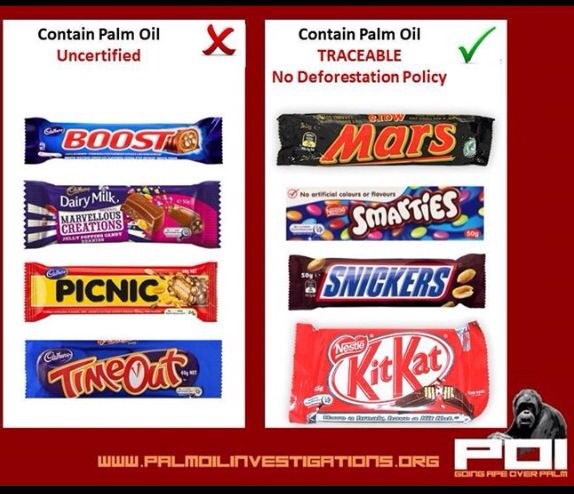By Cecilia Drury BER (S4E)
What is palm oil?
Palm oil is a comestible vegetable oil made from the fruit of palm trees. It is the most used vegetable oil worldwide due to its texture and colourless, odourless properties. Almost 50% of the food products and cosmetics we buy today contain palm oil, included in anything from toothpaste and pizza to shampoo and chocolate. The oil is produced by harvesting the fruit of the oil palm trees and crushing the kernels of the stones inside the fruit to extract the oil, which is then packaged and exported all over the world.
Why is palm oil bad for the environment?
The intensive farming of palm oil has been and continues to be one of the biggest threats to rainforests around the world. The equivalent of around one football pitch of the Amazon rainforest is cut down every minute to make way for plantations of oil palm trees, and while the Amazon is indeed the largest rainforest on Earth, covering over 5,500,000 km² (around 24 times the size of the UK) its size has been reduced dramatically over the last decade. Not only this, but the farmers cultivating oil palm trees have been known to use pesticides that can be extremely adverse to the surrounding wildlife, throwing the surrounding food webs off balance.
How did the problem start?
The threat of palm oil to rainforests dates to 2010, when the Indonesian government launched a program in which suitable areas for oil palm plantations were mapped and farmers were provided with finances to start growing a crop. To make way for the new crop, millions of acres of rainforest were burned or cut down, killing and destroying the homes of millions of creatures.
Consequences
The consequences of the palm oil crisis are extensive. They include mass loss and endangerment of species due to deforestation, species which are found exclusively in rainforests on a few islands offshore of Malaysia and Indonesia and contain some of the greatest biodiversity on Earth. Loss of biodiversity due to the hundreds of thousands of hectares of monoculture, freshwater pollution due to the pesticides used on oil palm crops and soil erosion again due to the biodiversity loss and unnatural conditions. The farming of this crop has also been accused of robbing the native indigenous people of their land and livelihood.

What is being done?
Without people acting against the crisis, setting down guidelines for sustainable palm oil production our consumption of this crop is expected to drastically increase. Fortunately, the RSPO (Roundtable on Sustainable Palm Oil), was founded in 2003 to do just that. There are many ways to make the growth of oil palm sustainable, the RSPO created a list of standards for producers that made the practice more ecologically friendly, some of these include setting concrete policies to get deforestation under control, giving damaged natural ecosystems space to recuperate and being transparent in their sourcing of the palm oil they sell, so buyers know where they are buying from.

What can you do?
There are plenty of small changes you can make to your everyday routines to help promote sustainable palm oil production. The more we reduce the amount of non-sustainable products we use, and producers’ products don’t get bought, the more it tells them that they should start changing their ways. Here are a few ways you can help:
- Check food labels for palm oil, if it contains it, make sure it is sustainably sourced (look for the ‘RSPO certified’ label)
- Avoid purchasing tropical hardwood products such as teak
- Check out the Netherlands’ scorecard for palm oil sustainability
- Use Ethical Consumer’s product list as a rough guide when shopping
As a simple guideline, here is a list of products most likely to contain palm oil:
- Bread
- Crisps
- Soap
- Shampoo
- Ice-cream
- Chocolate
- Biscuits
- Make-up
- Non-diary substitutes such as margarine
- Cooking oil
- Cleaning/dishwasher detergent







